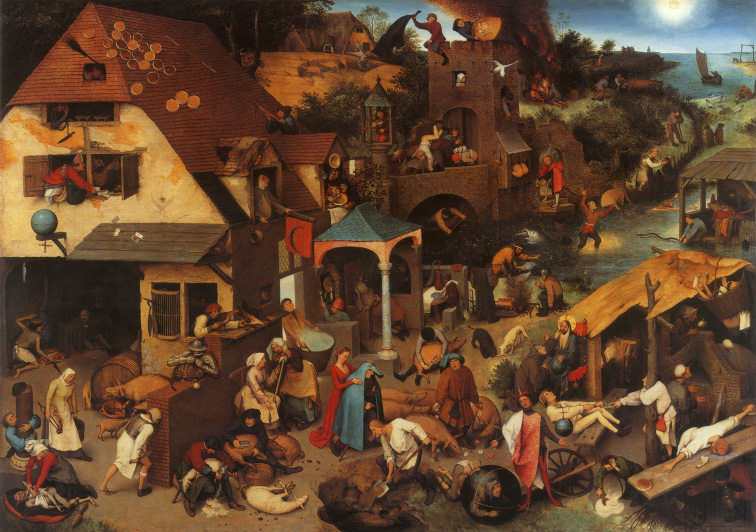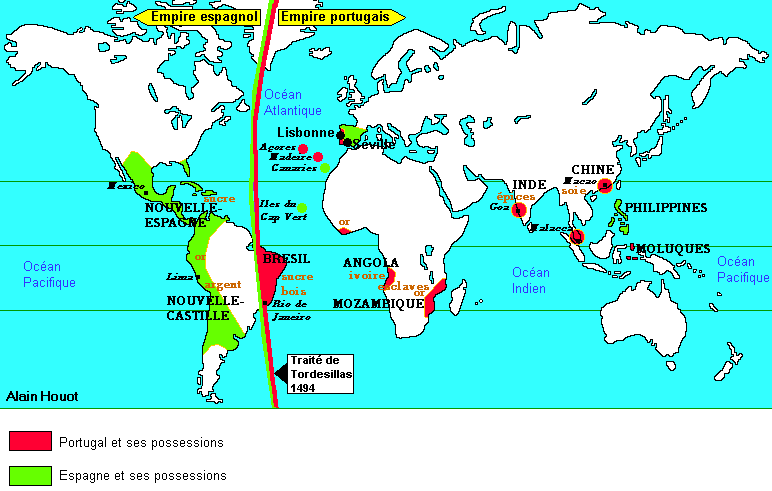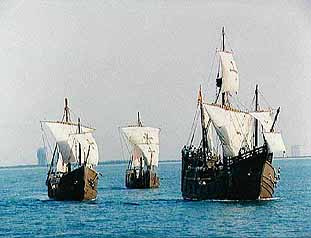How did Europeans, especially coastal nationalities, succeed in subduing the world from 1450 until 1850?
(answer)

Dutch Proverbs , Pieter Bruegel the Elder ,C.1525-1569
Historical Ecology: Accounting for European dominance
Columbus | consumption | political milieu | miracle
happen | consequences | terms
![]()
Europe's unsettled conditions
![]()
Cuba and the Straights of Florida
agriculture- three field system (1/3 left fallow) after 1200s
- four field system ("green manure") after 1750s
- agrarian life was labor (nine in ten people) intensive
- animal strength essential due to plows, esp, N. of Alps
- potatoes ripen months ahead of wheat or rye
- 1587-88 potatoes grown in Belgium & Austria
- diet consists of grains,soup, lentils, peas for 9 in 10 people.
food crises were cyclical
- 9 to 11 year cycles (solar & lunar variations)
- little ice age (solar variations; longer periods of time)
- famines; 12.7 per century, 900-1800. (Crosby, p. 150)
- 1600-1690s were a period of war, pestilence, & starvation.
- cannibalism is evident in Scandinavian church records, during the "starving times."
- 1740, 1770-1772, famine in Germany
- 1815, following a volcanic eruption, was a summer without sun, poor crops
- no period was without the impact of famines since genetic markers in women and men had intergenerational impacts on survivors.
Islamic: Mediterranean & Asian peoples
- Moors or North Africans, invade Iberia, Spain retreats
- Saracens, Jerusalem & Alexandria fell
- Turks, Ottoman Empire; Istanbul & Vienna fell
Mongols
- Poland and Russia raided
- Vienna besieged
Black Death, 1340s-1350s
- one fourth - one third perished in a half decade
- recurrent pandemics lasted until 1750s
Birth and death rates
- high mortality
- high fertility to compensate
- large teenage populations contribute to wars
consumption | political milieu | miracle happen | consequences
The Miracle of the Indies:
- Crops: maize, potatoes, beans > nutrition, life span >.
- Trade: gold, silver, wood and sugar created surplus.
- Urban revival:
1350-1550, Europe's urban boom
- from 1530-1591 Spain's numbers nearly doubled
- 3 to 5.92 millions
- Slavery: Indigenous & African labor accelerated surplus.
- Closing of the east by Turkish invasions forced a western focus on nations seeking to replace Genoa and Venice.
- Second wave of
European growth
- from 1650-1800:
- 7.5 to 11.5 million in Spain
- 11 to 19 million in Italy
- 5 to 9.25 million in England & Wales
- 16 to 29 million in France.
- 1700, corn on the Danube, 1800 in the Ukraine
- Adam Smith extolled the benefits of potatoes in 1776.
Crosby, 151-152, 157.
![]()
consumption | political milieu | miracle happen | consequences
Three Revolutions or one?
- Columbian Exchange: old and new world mixture.
- Renaissance & Reformation: collapse and revival of Catholicism, Puritanism, & learning due to printing.
- Commercial Revolution: the replacement of metal by paper, rise of accounting, assurance and credit.
An ecological invasion accounts for the revolutionary changes we see that occurred after 1493.
Consumption | political milieu | miracle happen | consequences
All of these sweeping cultural, intellectual, financial, and technological changes were contributing to a rapid increase in the European family size, survival rates of women and children, and a more productive use of land. As sheep grazing expanded due to better cropland practices, money surpluses accumulated.
Demographic and agricultural changes began undermining the feudal traditions that had solidified after the rise of Islam (750 AD).
The long term past:
AD first millennia
632, death of Mohammed
700, Arabs take N. Africa
751, Arabs defeat China in central Asia
843, Division of Europe by Charlemagne's heirs
846, Arabs sack Rome
930, Cordoba became the seat of Arabic Learning in Spain
964, New Mayan Empire
AD second millennia
1075, Turkish domination in Syria and Palestine
1090, 1st clock, Beijing
1096, start of 1st Crusade
1125, mariner's compass described in Europe
1145, 2d Crusade
1158, Munich focus of the salt trade
1187, Saladin takes Jerusalem
1193, Indigo imported to Britain from India, dye
1218, fall of Persia, Iran, to Genghis Khan
1225, cotton cloth made in Spain
1267, Aztecs migrate to lake Texcoco, Mexico
1280, Kublai Khan conquers China
1282 Florence as finance center of Europe
1312, Canary islands found by Genoa
1315, silk manufacture in Lyon
1325, AZTECS establish TENOCHTITLAN
1332, Bubonic plague begins in India
1333, Arab zenith in Grenada, Spain
1337, 100 Years War starts, Britain - France
1347, Bubonic Plague, or the Black death hits Europe
1349, German cities' persecute Jews
1351, 75 million dead of the plague
1415, Jan Hus condemned and burned
1453, Fall of Istanbul to Ottoman Turks
1453, Gutenberg's printing press, Mainz
1464, first mail service in Europe, by France
1477, Netherlands become a Hapsburg fief
1492, Pivotal Year
Turks invade Hungary
Castille recaptures Grenada from Arabs
August 3rd, Columbus and 70 men departed Palos.
1509, start of the Slave trade in the Americas
1517, Coffee brought from Arabs to Europe.
1517, Luther defies the Church
1520, chocolate from Mexico
1531, the Great Comet !
1532, earliest sugar planted in Brazil
1537, Mercator's first map: Flanders
1541, Hernando de Soto crosses the Mississippi River
1557, influenza in Europe
1567, Rio de Janeiro established by Portugal
1575, Italy produces imitation Chinese porcelains
1580, Portugal unites with Spain, potatoes from Peru appear in Europe
1605, Santa Fe, N. Mexico founded by Spain
1609, Kepler's Laws of Motion
1717, Assiento gives Britain control of Spanish slave trade
1750, Crosby's benchmark date
1789, French Revolution
1803, Anglo-Franco Peace
1814, Congress of Vienna
1846, beginning of the Irish famine
Treaty of Tordesillas divided the world between Portugal and Spain, bitter Iberian rivals.

consumption | political milieu | miracle happen | consequences
"The European pioneers were accompanied and often preceded by their domesticated animals, walking sources of food, leather, fiber, power and wealth, and these animals often adapted more rapidly to the new surroundings and reproduced more rapidly than their masters."
of the Island Arawaks:
"are very unskilled with arms . . . [and] could all be subjected & made to do all that one wished.""In another island . . . greater than Española . . . . there is gold beyond counting !"
"raising sugar or wheat or what ever you have on Madeira is, ' a truly penitential labor.' The original preparation of the land for farming, the clearing and grabbing of the primordial growth, burned or not must have been a Augean (immense and heroic) task."
Crosby, Ecological Imperialism, p. 70.
“Indian killers – smallpox, measles, influenza, tuberculosis, and others – carried off disproportionately large percentages of people aged about fifteen to forty, men and women in the prime years of life who are largely responsible for the vital functions of food procurement, defense, and procreation”
Crosby, pg. 101.
Terms to know
Columbian exchange
Crosby's assumptions
Ecological Invasions
Famine

Asia,
The wealthiest, most sophisticated, and advanced place on earth in 1600.
February 12, 2008
-
problem solving index.
.gif)





